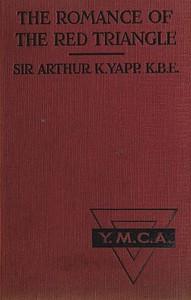Read this ebook for free! No credit card needed, absolutely nothing to pay.
Words: 29761 in 13 pages
This is an ebook sharing website. You can read the uploaded ebooks for free here. No credit cards needed, nothing to pay. If you want to own a digital copy of the ebook, or want to read offline with your favorite ebook-reader, then you can choose to buy and download the ebook.
PUBLISHED WEEKLY. NEW YORK, TUESDAY, JUNE 4, 1895. FIVE CENTS A COPY.
HEROES OF AMERICA.
THE FLAG-BEARER.
BY THE HONORABLE THEODORE ROOSEVELT.
n no war since the close of the great Napoleonic struggles has the fighting been so obstinate and bloody as in the civil war. Much has been said in song and story of the obstinate courage of the Guards at Inkerman, of the charge of the Light Brigade, and of the terrible fighting and loss of the German at Mars la Tour and Gravelotte. The praise bestowed upon the British and Germans for their valor, and for the loss that proved their valor, was well deserved. But there were over one hundred and twenty regiments, Union and Confederate, each of which in some one battle of the civil war suffered a greater loss than any English regiment at Inkerman or at any other battle in the Crimea; greater loss than was suffered by any German regiment at Gravelotte, or at any other battle of the Franco-Prussian war. No European regiment in any recent struggle has suffered such losses as at Gettysburg befell the 1st Minnesota, when 82 per cent. of the officers and men were killed and wounded; or the 141st Pennsylvania, which lost 76 per cent., or the 26th North Carolina, which lost 72 per cent.; such as at the second battle of Manassas befell the 101st New York, which lost 74 per cent.; and the 21st Georgia, which lost 76 per cent. At Cold Harbor the 25th Massachusetts lost 70 per cent., and the 10th Tennessee at Chickamauga 68 per cent.; while at Shiloh the 9th Illinois lost 63 per cent., and the 6th Mississippi 70 per cent.; and at Antietam the 1st Texas lost 82 per cent. The loss of the Light Brigade in killed and wounded in its famous charge at Balaklava was but 37 per cent.
These figures show the terrible punishment endured by these regiments--chosen at random from the head of the list--which shows the slaughter roll of the civil war. Yet the shattered remnant of each regiment preserved its organization, and many of the severest losses were suffered by regiments in the hour of triumph, and not of disaster. Thus, the 1st Minnesota at Gettysburg suffered its appalling loss while charging a greatly superior force, which it drove before it; and the little huddle of wounded and unwounded men who survived their victorious charge actually kept both the flag they had captured and the ground from which they had driven their foes.
A number of the Continental regiments under Washington, Greene, and Wayne did valiant fighting, and suffered severe loss. Several of the regiments raised on the Northern frontier in 1814 showed, under Brown and Scott, that they were able to meet the best troops of England on equal terms in the open, and even to overmatch them in fair fight with the bayonet. The regiments which in the Mexican war, under the lead of Taylor, captured Monterey, and beat back Santa Anna at Buena Vista, or which, with Scott as commander, stormed Molino Del Rey and Chapultepec, proved their ability to bear terrible loss, to wrest victory from overwhelming numbers, and to carry by open assault positions of formidable strength held by a veteran army. But in none of these three wars was the fighting so resolute and bloody as in the civil war.
Countless deeds of heroism were performed by Northerner and by Southerner, by officer and by private, in every year of the great snuggle. The immense majority of these deeds went unrecorded, and were known to few beyond the immediate participants. Of those that were noticed it would be impossible even to make a dry catalogue in ten such volumes as this. All that can be done is to choose out two or three acts of heroism not as exceptions, but as examples of hundreds of others. The times of war are iron times, and bring out all that is best as well as all that is basest, in the human heart. In a full recital of the civil war, as of every other great conflict, there would stand out in naked relief feats of wonderful daring and self-devotion, and, mixed among them, deeds of cowardice, of treachery, of barbarous brutality. Sadder still, such a recital would show strange contrasts in the careers of individual men--men who at one time act well and nobly, and at another time ill and basely. But though the ugly truths must not be blinked, and though the lessons they teach should be set forth by every historian, and learned by every statesman and soldier, yet these are not the truths on which it is best worth while to dwell. For our good-fortune the lessons best worth learning in the nation's past are lessons of heroism.
From time immemorial the armies of every warlike people have set the highest value upon the standards they bore to battle. To guard one's own flag against capture is the pride, to capture the flag of one's enemy the ambition, of every valiant soldier. In consequence, in every war between peoples of good military record, feats of daring performed by color-bearers are honorably common. The civil war was full of such incidents. Out of very many, two or three stand as especially noteworthy.
One occurred at Fredericksburg on the day when half the brigades of Meagher and Caldwell lay on the bloody slope leading up to the Confederate entrenchments. Among the assaulting regiments was the 5th New Hampshire, and it lost 186 out of 300 men who made the charge. The survivors fell back sullenly behind a fence, within easy range of the Confederate rifle pits. Just before reaching it the last of the color-guard was shot, and the flag fell in the open. A Captain, Perry, instantly ran out to rescue it, and, as he reached it, was shot through the heart; another Captain, Murray, made the same attempt, and was also killed; and so was a third, Moore. Several private soldiers met a like fate. They were all killed close to the flag, and their dead bodies fell across one another. Taking advantage of this breastwork Lieutenant Nettleton crawled from behind the fence to the colors, and bore back the blood-won trophy.
Another took place at Gaines Mill, where Gregg's 1st South Carolina formed part of the attacking force. The resistance was desperate, and the fury of the assault unsurpassed. At one point it fell to the lot of this regiment to bear the brunt of carrying a certain strong position. Moving forward at a run, the South-Carolinians were swept by a fierce and searching fire. Young James Taylor, a lad of sixteen, was carrying the flag, and was killed after being shot down three times, twice rising and struggling onward with the colors. The third time he fell the flag was seized by George Cotchet, and when he in turn fell, by Shubrick Hayne. Hayne was also struck down almost immediately, and the fourth lad, for none of them were over twenty years old, grasped the colors, and fell mortally wounded across the body of his friend. The fifth, Gadsden Holmes, was pierced with no less than seven balls. The sixth man, Dominick Spellman, more fortunate, but not less brave, bore the flag throughout the rest of the battle.
Yet another occurred at Antietam. The 7th Maine, then under the command of Major T. W. Hyde, was one of the hundreds of regiments that on many hard-fought fields established a reputation for dash and unyielding endurance. Toward the early part of the day at Antietam it merely took its share in the charging and long-range firing with the New York and Vermont regiments, which were its immediate neighbors in the line. The fighting was very heavy. In one of the charges the Maine men passed over what had been a Confederate regiment. The gray clad soldiers were lying, both ranks, soldiers and officers, as they fell, for so many had been killed or disabled that it seemed as if the whole regiment was prone in death.
Free books android app tbrJar TBR JAR Read Free books online gutenberg
More posts by @FreeBooks

: The Romance of the Red Triangle The story of the coming of the red triangle and the service rendered by the Y.M.C.A. to the sailors and soldiers of the British Empire by Yapp Arthur K Arthur Keysall Starmer W P Illustrator Wright Edgar Illustrator - World


: The Style Book of The Detroit News by Detroit News Weeks A L Albert Loren Editor - Printing Style manuals; Journalism Style manuals






